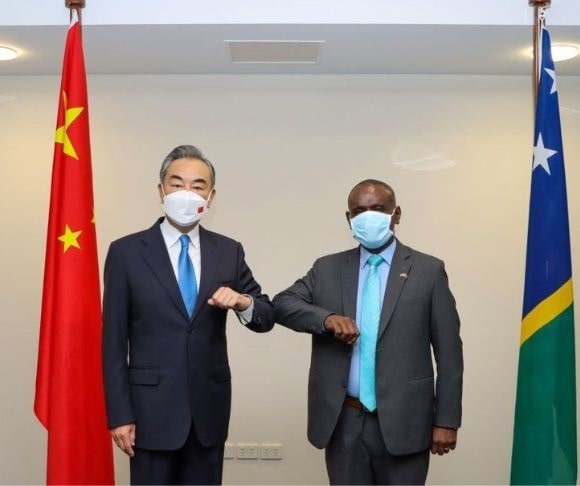Beijing’s influence in the Indo-Pacific grows more assertive, the United States and its allies are feeling the impact. It started on Aug. 25, when the Solomon Islands government denied the US Coast Guard Cutter (USCGC) Oliver Henry a scheduled port call for replenishment at Honiara, the capital city. Rebuffed, the ship was forced to divert to Papua New Guinea for services. Now the Solomons have “suspended” transit through its surrounding waters for all foreign navy vessels.
“The Government of the Solomon Islands did not respond to the US Government’s request for diplomatic clearance for the vessel to refuel and provision in Honiara,” Kristin Kam, a Coast Guard public affairs spokesperson in Hawaii, explained to Reuters. The refusal to grant permission for a routine visit by a US vessel is unusual, especially when the USCGC Henry was participating in patrols to help stop illegal fishing in the South Pacific, part of Operation Island Chief, protecting the economic exclusion zones of Fiji, Papua New Guinea, Vanuatu, and Solomon Islands.
Solomon Islands Denies Access Because It Can?
Also part of the operation is the British navy, and, though not confirmed, the HMS Spey was denied access. Since both ships were operating for the benefit of the Solomon Islands, the denial of port visits is strange. Is the message now that the Honiara government has China as a security partner, it will show some gratuitous muscle?
China increased its control following the signing of the People’s Republic of China (PRC) and Solomon Islands security pact in March 2022. The agreement is troubling since it codifies the PRC’s direct law enforcement aid to the Honiara government, opening the door to the Solomons’ requests for police and military personnel to intervene to quell future civil disorder, in the aftermath of riots in November 2021.
Liberty Nation reported on the unrest, which, ironically, was brought on by Solomon Islands Prime Minister Manasseh Sogavare’s unpopular move to strengthen ties with the PRC, with the potential for the Chinese Communist Party (CCP) to establish a more permanent military presence. “What is more concerning to traditional powers and the region is that this pact could pave the way for China to establish a military base in Solomon Islands, though these speculations have been dismissed by Beijing and Honiara,” The Diplomat reported. Based on what China has been doing in other parts of the world, the PRC denials ring hollow. For example, the CCP recently sent instructors to train the police force for civil management, suppression of riots, and other tactical law enforcement. Previously, neighbors New Zealand and Australia had provided that kind of support.
“We have requested our partners to give us time to review and put in place our new processes, before sending further requests for military vessels to enter the country. These will apply universally to all visiting naval vessels,” Sogavare announced in a public statement. Two questions arise from the prime minister’s announcement. First, why is it suddenly a priority to modify the Solomon Islands processes for hosting foreign vessels’ port calls? And how much will the CCP influence these new protocols?

Chinese State Councilor and Foreign Minister Wang Yi L and Solomon Islands’ Foreign Minister Jeremiah Manele (Photo by Xinhua via Getty Images)
As a rationale for the sudden desire to put new procedures in place, Sogavare said that “he wanted to build national capacity to police the Pacific Island nation’s exclusive economic zones,” the Associated Press reported. The problem is the Solomons do not appear to have a fleet of patrol vessels sufficient to accomplish this. But China does — and is eager to help. With the new security agreement between Beijing and Honiara, the way is paved for the People’s Liberation Army (PLA) naval force to roam at will to discourage any foreign navy from entering the Solomon Islands’ waters
This move on the part of the Sogavare government shows just how much sway the United States and other Western nations have lost in the Indo-Pacific. “If you’re a little tiny place in the South Pacific and the Chinese show up with enough money, and they offer a chance for you to play with them, and you watch the Americans, who look weaker and weaker, you can sort of see the trend,” former Speaker of the House Newt Gingrich told Fox News. Seen more regionally, the Solomons are just 1,200 miles from Australia, and the Aussies take China’s close incursion as a direct threat. Gingrich made the point that Honiara is a long way from China, signaling “how much they are beginning to extend their power base and trying to basically dominate the Western Pacific,” he explained.
China Will Dominate Pacific, or So They Say
The CCP also engages in effective information warfare to push its Pacific influence campaign. “So, for example, they’ll spread narratives like that China’s domination of the Pacific is inevitable. The best thing you can do is come to a beneficial arrangement with China now before it’s too late,” John Lee, a senior fellow at the Hudson Institute, told the Financial Times. Though this line of propaganda may seem farfetched to Western ears, without a compelling narrative to the contrary, Pacific nations like the Solomons are finding the Beijing story persuasive.
Beijing’s activities are part of the CCP’s political warfare, and China makes no distinction between that and a shooting war. For the PLA, all is war. The US strategy needs to address the grim reality of the PRC’s spreading control in the Pacific.
The views expressed are those of the author and not of any other affiliation.




